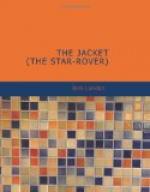Very well. Cut off all my fingers. I am I. The spirit is entire. Cut off both hands. Cut off both arms at the shoulder-sockets. Cut off both legs at the hip-sockets. And I, the unconquerable and indestructible I, survive. Am I any the less for these mutilations, for these subtractions of the flesh? Certainly not. Clip my hair. Shave from me with sharp razors my lips, my nose, my ears—ay, and tear out the eyes of me by the roots; and there, mewed in that featureless skull that is attached to a hacked and mangled torso, there in that cell of the chemic flesh, will still be I, unmutilated, undiminished.
Oh, the heart still beats. Very well. Cut out the heart, or, better, fling the flesh-remnant into a machine of a thousand blades and make mincemeat of it—and I, I, don’t you understand, all the spirit and the mystery and the vital fire and life of me, am off and away. I have not perished. Only the body has perished, and the body is not I.
I believe Colonel de Rochas was correct when he asserted that under the compulsion of his will he sent the girl Josephine, while she was in hypnotic trance, back through the eighteen years she had lived, back through the silence and the dark ere she had been born, back to the light of a previous living when she was a bedridden old man, the ex-artilleryman, Jean-Claude Bourdon. And I believe that Colonel de Rochas did truly hypnotize this resurrected shade of the old man and, by compulsion of will, send him back through the seventy years of his life, back into the dark and through the dark into the light of day when he had been the wicked old woman, Philomene Carteron.
Already, have I not shown you, my reader, that in previous times, inhabiting various cloddy aggregates of matter, I have been Count Guillaume de Sainte-Maure, a mangy and nameless hermit of Egypt, and the boy Jesse, whose father was captain of forty wagons in the great westward emigration. And, also, am I not now, as I write these lines, Darrell Sanding, under sentence of death in Folsom Prison and one time professor of agronomy in the College of Agriculture of the University of California?
Matter is the great illusion. That is, matter manifests itself in form, and form is apparitional. Where, now, are the crumbling rock-cliffs of old Egypt where once I laired me like a wild beast while I dreamed of the City of God? Where, now, is the body of Guillaume de Sainte-Maure that was thrust through on the moonlit grass so long ago by the flame-headed Guy de Villehardouin? Where, now, are the forty great wagons in the circle at Nephi, and all the men and women and children and lean cattle that sheltered inside that circle? All such things no longer are, for they were forms, manifestations of fluxing matter ere they melted into the flux again. They have passed and are not.




